In October 2016, the military offensive to retake the city from the Islamic State group (ISg) began. The battle was officially declared “over” five years ago, on 10 July 2017. For the people of Mosul, life has slowly resumed, but rebuilding the city is still taking time, and the healthcare system is no exception to that. The voices of Mosulis tell the story of a community’s effort to face daily challenges, a story of resilience and hope.
“Mother of two springs, that is what we call the city,” says Imad Abdullah, a patient at the MSF-run Al-Wahda hospital for orthopaedic surgeries in East Mosul, that sits on the left bank of the Tigris River. “Nowhere in the world you can find this beautiful season happening twice.” In 2016, Mosul, Iraq’s second largest city, experienced one of the deadliest urban battles since the Second World War.
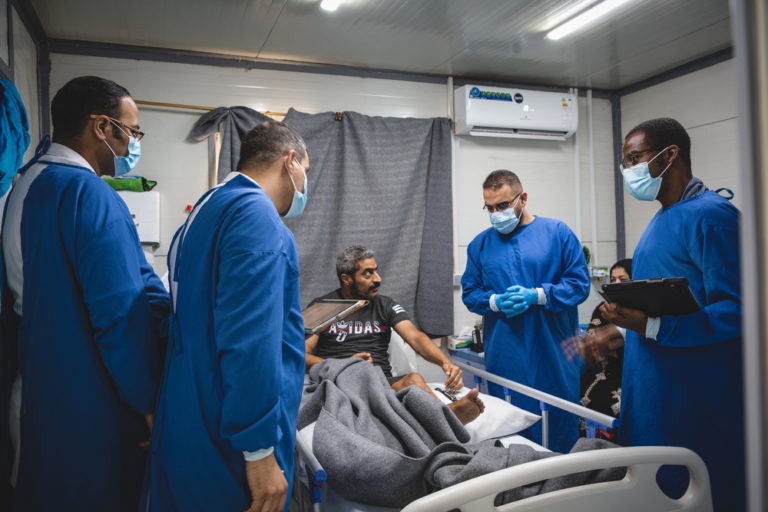
Five years after the battle officially ended and Iraqi forces retook the city from the Islamic state group, people have returned to Mosul and life in the city is resuming, despite the many challenges people face and the destruction that is still visible.
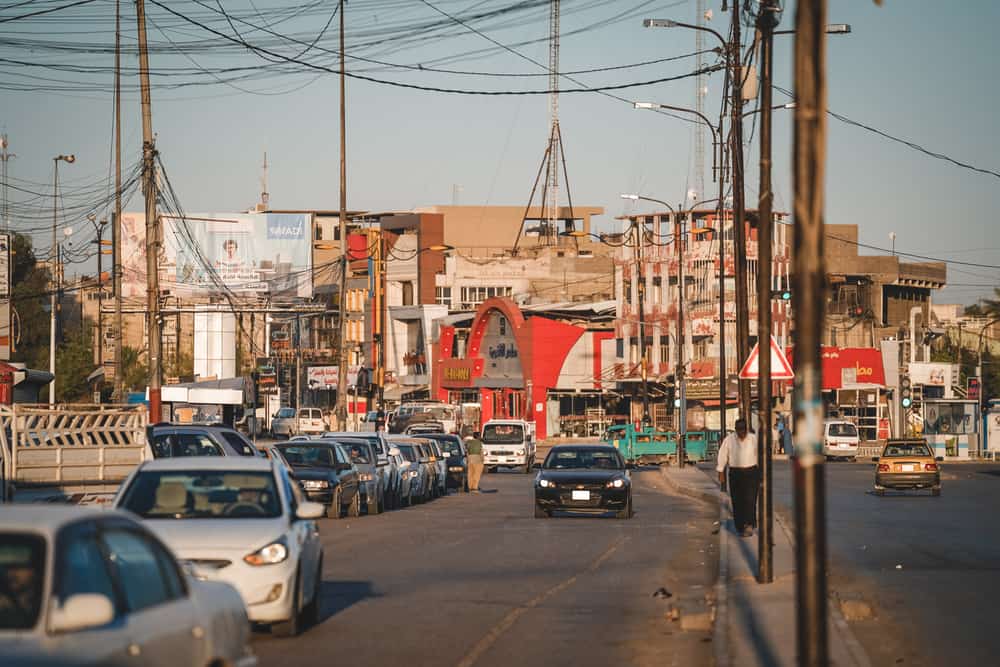
Today, in Mosul, bridges that were destroyed during the war have reopened and West and East Mosul are reconnected again. Over the past five years, people living in Mosul have seen the streets change, as barriers and checkpoints were gradually removed—a sign of improved security. Today, parents are no longer afraid to let their children play outdoors and send them to school. “Life changed from darkness back to light for us,” said Saad Hamdoon, the uncle of Hamdoon Jassim, a patient at MSF’s Nablus field hospital in West Mosul. The teenager was waiting in the emergency room with a plaster cast on his left foot, ready to be discharged.
“Mosul is home”
A wide range of initiatives pop up in Mosul every day: people volunteer to remove the rubble in the old city, to repair houses, to clean the streets. Influencers and social media activists from the city have launched fundraising campaigns to help families rebuild their houses or start businesses. A few days ago, a picture was shared on the social media page of one neighbourhood, showing a child who waters the newly planted trees on his street every night. The trees themselves were planted by a group of volunteers. This is just one example of thousands of initiatives led by people in Mosul.
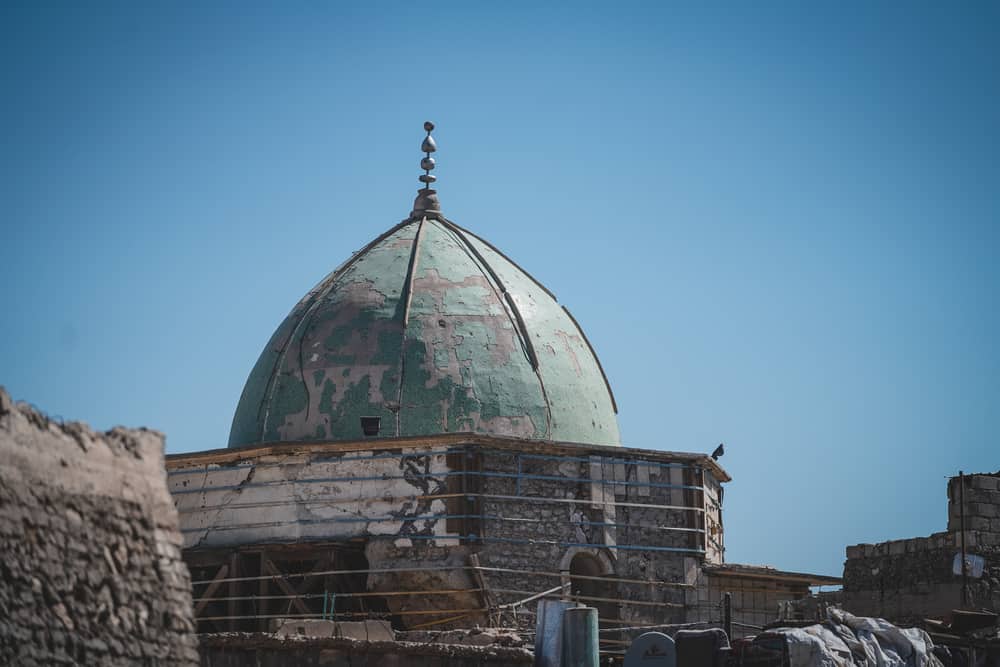
People are not only rebuilding the city, but also their lives. Ahmed Abdullah has been working with MSF since 2017. He started at MSF’s Hamman Al-Alil field trauma hospital for war-wounded patients who were brought to the facility from the city.
“I’ve seen people, foreigners working for humanitarian organisations, running before us, faster than us, rushing to rescue the wounded. We, the people of Mosul, we were doing our best, but we were still very much in a state of shock, because of what we have been through. Step by step, with the encouragement of the international teams, and the strong relationship we have built together, we have overcome the shock. We started to rush too, to rescue the wounded from our city. It was the first time we were involved in saving lives. We felt a huge accomplishment. Before, the only realities we lived were brutality, killing and mass displacements. We were not very familiar with the humanitarian spirit. Now a big part of me has changed thanks to humanitarian work. Because I have seen humanity as I never had before.”
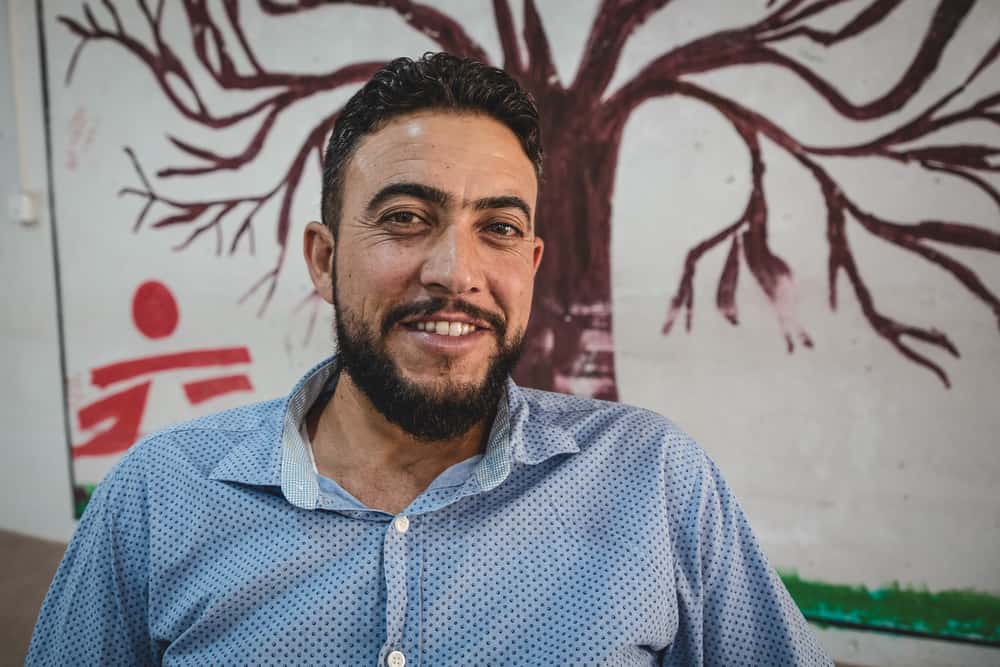
Needs still outweigh recovery efforts
Even though the people of Mosul feel change, their daily reality is not yet without challenges. Many families lost everything in the war and still struggle earning a livelihood and to find suitable accommodation. Some families lost people who earned their only source of income, so restarting from nothing can take them many years. Because of the level of destruction of the city, the number of houses available to host families dramatically dropped. When the inhabitants slowly came back, some poor families had to live in damaged houses while many others had to rent other accommodation, despite facing financial difficulties. Without job opportunities, especially for young people, it is hard for many families to settle. The slowly recovering economic and social situation is an extra burden on people.
Mosul once had the second-largest healthcare system in Iraq, but the situation is still far from what it used to be before the war. As medical facilities were heavily damaged during the war, people still struggle to access affordable high-quality healthcare. The destruction did not spare facilities outside of Mosul neither, therefore people often have to make long trips to reach the few functioning ones in town.
“I’m a mother of three children, so I often need to visit healthcare facilities,” says Jihan Ahmed*, caretaker and aunt of Samad, a newborn hospitalised at Nablus hospital and born by caesarean section surgery the night before. “We struggle to access affordable quality care, that’s why we came all the way from East Mosul to this hospital in West Mosul.” Now, the main hospitals have reopened in temporary structures and caravans, which are just short-term solutions. Some facilities are currently far from their previous locations, which were much more central, making it harder for people to reach them as quickly as they could previously.
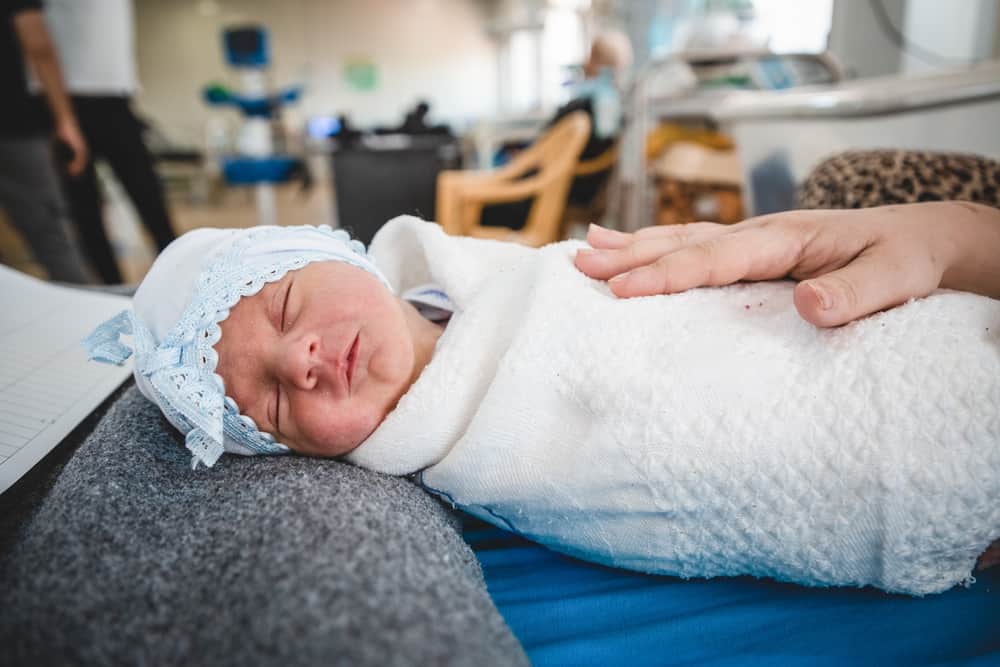
There are also still supply and medication shortages. For example, far fewer surgeries per day are possible now compared to before the war, as resources have to be rationed and because the same bed and surgical capacity does not exist anymore.
During the battle and just after, MSF teams treated victims of the war in the emergency department and the operating theatre of Nablus hospital. These activities evolved as medical needs changed.
In the first six months of 2022, 3,853 children were born in MSF’s two maternity hospitals and 489 surgeries were performed in Al-Wahda facility.
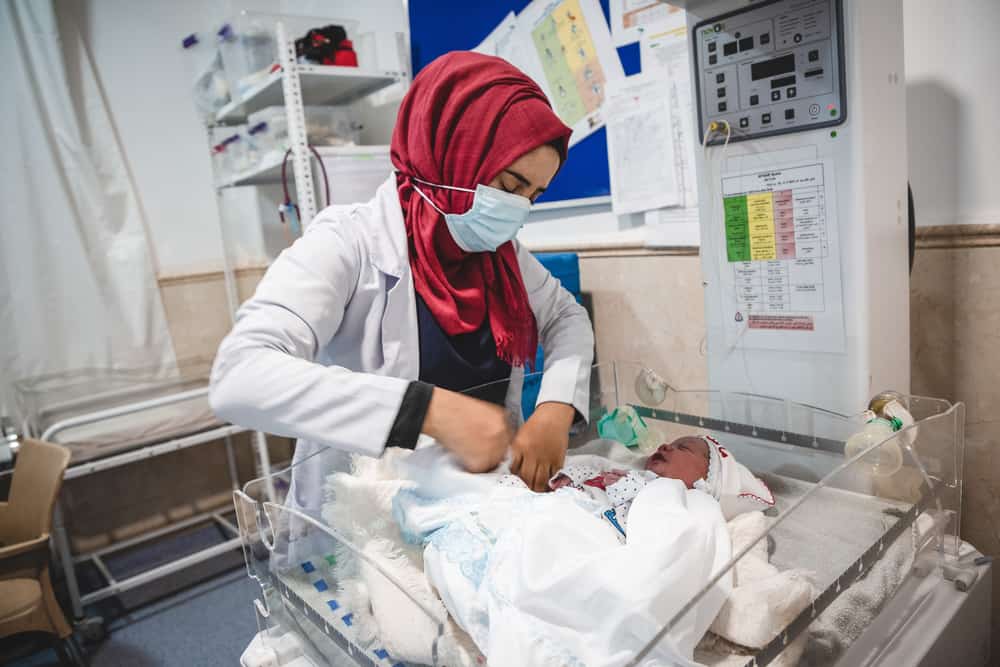
Enduring consequences of war
Faris Jassim was injured during the battle. He has suffered several complications, went through 25 surgeries, and has still not fully recovered.
“I went through very complicated moments after being injured,” he said. “For two years I had suicidal thoughts because of all these surgeries and treatments that seemed endless to me. But when I started to see my leg recovering, I felt hope again. It’s a huge leap to go from wheelchair-bound to walking independently now.”
Faris is about to be discharged from the MSF-run Al-Wahda Hospital in East Mosul and the first thing he is eager to do is to go back to work in his shop.
In 2017, the majority of patients in MSF facilities in and around Mosul were dealing with psychological issues after what they have been through. Although mental health needs have reduced, the trauma people experienced is not forgotten.
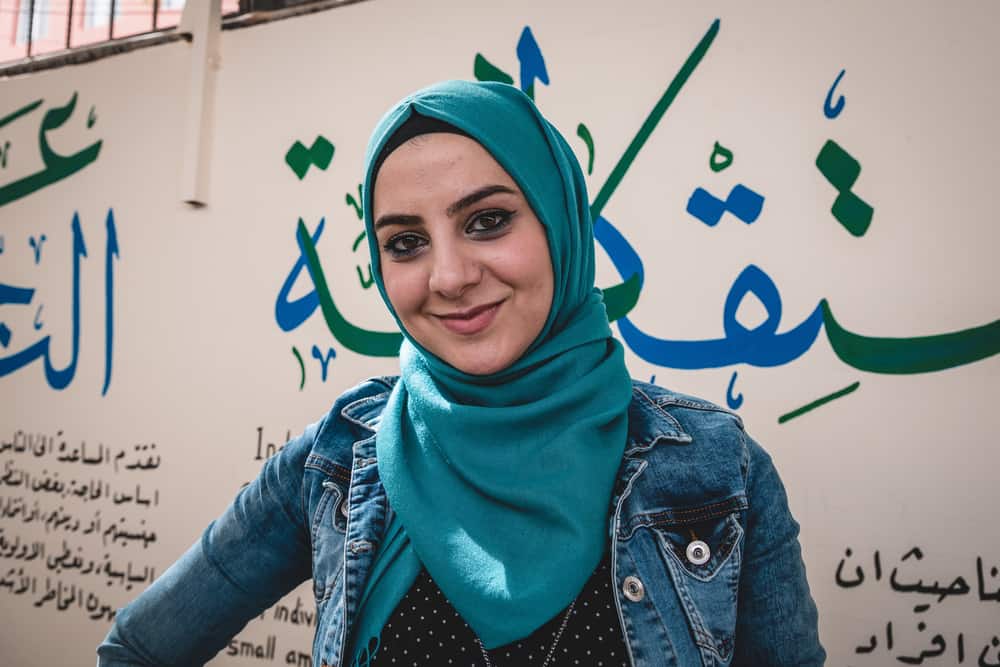
During the war, people lived in constant fear thinking they may lose their house, their family members or their life at any time. As a mother, Hanan had to reassure her children that they would be ok and show strength for her whole family. Due to the violence, they eventually had to flee their home in West Mosul.
“We fled our neighbourhood by foot, crossing to East Mosul. Halfway over the bridge I stopped and looked back to West Mosul. The scene of smoke and destruction broke my heart. It was such a pain to see Mosul, our beloved mother like that, dying in front of our eyes.”
Today, MSF offers a safe place for patients to share their stories and talk about the trauma they experienced. Through mental healthcare sessions for individuals or groups, people can unlock themselves and slowly build coping mechanisms with the help of mental health professionals. Coming to ask for mental health support can be difficult as—like in many places around the world—the subject remains taboo in many families.
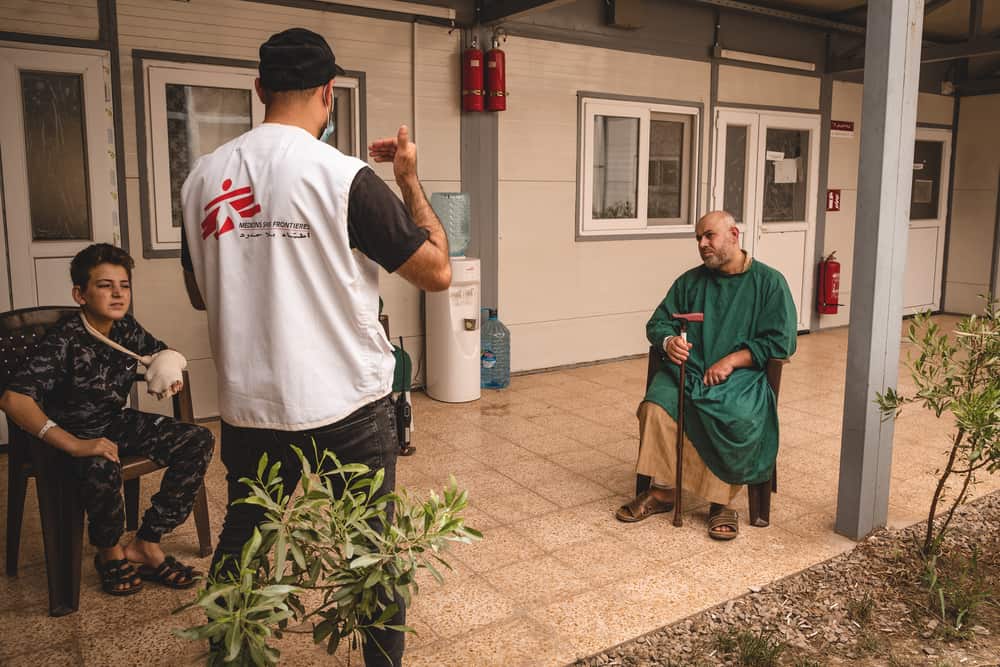
People of Mosul have faced many difficulties, but they never lack courage, patience and strength.
*Name has been changed.
Mosul, 5 years on – Timeline of MSF activities
2014: Islamic State Group takes Mosul
On June 10th, 2014, Iraq’s second largest city, Mosul, located in Ninewa Governorate, falls to the Islamic State group. After the control of the Islamic State group over Mosul and the following offensives to retake the city from their control, over one million Iraqis fled their homes to seek safety, mostly in Iraqi Kurdistan. MSF launches an emergency response to provide basic medical care and essential relief items for displaced people in several locations and governorates in northern Iraq. The support to the displaced continues over 2015.
2016: Start of the battle of Mosul, MSF emergency response in and around the city
On October 16th, the offensive to retake the city starts. Iraqi security forces, with the help of a US-led international coalition fought for nine months. Almost every street and every house were visited and secured. Thousands of people were wounded or killed in the fighting and more than one million were displaced. This battle remains one of the deadliest urban battles since the Second World War, with medical needs during and after the battle among the highest in the country’s history. Today, the city is still struggling to recover from the aftermath.
- November: MSF deploys mobile teams to newly erected camps west of Erbil —where displaced people were settling— to provide essential relief items and basic healthcare services to people fleeing Mosul.
- December: In Qayyarah, a town located on the west bank of the Tigris River, about 60 kilometres south of Mosul, MSF opens a field hospital with an emergency room, operating theatre and 32-bed inpatient department. In its first month, the hospital treats more than 1,000 emergency patients and carries out more than 90 surgeries. Later, a therapeutic feeding centre is added for children suffering from malnutrition as a result of severe food shortages in besieged West Mosul.
- Between October and December MSF opens several trauma stabilisation units around Mosul to provide emergency surgery for war-wounded patients escaping Mosul.
2017: MSF scales up assistance
When the offensive reached West Mosul in mid-February, the number of people seeking safety in camps east of Mosul in areas within the Kurdistan Region of Iraq continued to increase.
MSF teams respond to the emergency in and around Mosul by positioning several trauma stabilisation posts close to the front lines. MSF teams worked in 16 locations across Ninewa and Erbil governorates, providing basic healthcare, treatment for non-communicable diseases and mental health support to thousands of people displaced from Mosul.
On July 10th, the battle of Mosul is declared over.
- January, MSF sets up a 70-bed hospital with a trauma stabilisation unit, emergency room, intensive care unit, inpatient department and maternity capacity inside a former orphanage to the northeast of Mosul.
- February: MSF deploys its first mobile surgical unit trailer to operate as a fully functioning trauma facility in Hammam Al-Alil—a city about 27 kilometers south-east of Mosul.
- March: MSF transforms a former retirement home in East Mosul into a facility with an emergency room, operating theatre, and maternity and inpatient departments. Our teams also start providing post-operative rehabilitation and psychosocial support in a 40-bed hospital in Hamdaniyah, southeast Mosul. In the same month, MSF opens a 24/7 emergency room, a surgical unit and a 32-bed post-operative care ward in Al-Ta’aheel hospital.
- June: MSF opens Nablus hospital, West Mosul, to give life-saving trauma assistance to war-wounded people escaping from the Old City, and to provide maternal care for people in the area. Later on, as war-related trauma cases decrease, MSF adapts Nablus Hospital by expanding the maternity, new-born and paediatric care activities.
2018: Returning and facing urgent needs
One year after the city was taken back from the control of the Islamic State group, many families return to neighbourhoods scarred by conflict and years of living under the Islamic State control. The situation shifts from an emergency to one of recovery and stabilisation. But the public infrastructure struggles to respond to the increasing needs. MSF activities develop through the year, adapting to the evolving context to support the public system and respond to the acute needs of the population.
- April: MSF opens a comprehensive post-operative care facility in in Al-Salam and Al- Shifaa hospital complex, in East Mosul, to provide services for people injured by violence or accidental trauma.
- July: In response to a measles outbreak, MSF supports the Department of Health to carry out a measles vaccination campaign for more than 42,000 children living in camps for displaced people in Qayyarah.
2019: Supporting the healthcare system of the city
While there is major investment to rebuild the city, everything takes time. As displaced families return to Mosul, the demand for healthcare, including sexual and reproductive healthcare, increases. But many healthcare facilities have been destroyed and there is an overall shortage of healthcare specialists. MSF continues to support existing healthcare facilities while opening new facilities to address the acute needs with a focus on child and maternal healthcare.
- May: A new 20-bed ward was added to Nablus hospital for paediatric care. In December, MSF adds a new operating theatre to the hospital in response to the continuous need for maternal healthcare, including as c-sections.
- July: MSF opens Al-Amal basic maternity obstetrics and newborn care centre in West Mosul to assist up to 300 women per month.
- December: MSF completes building Al-Shifaa hospital for infectious diseases. The 28-bed hospital is the only infectious disease hospital in the city. Later the hospital serves as a main COVID-19 isolation and treatment hospital.
2020: Supporting the response to the pandemic while providing essential healthcare to the population
More than three years have passed since the end of the war, but the devastating impact is still felt in Ninewa. Many people are still displaced, but in October, the Government of Iraq decides to close most of the displacement camps, forcing people to return to the areas from which they had fled.
The COVID-19 pandemic complicates the situation further, causing health structures to suspend activities and overwhelming the ones that remained active. MSF adapts its services to support the COVID-19 response while continuing to ensure access to basic healthcare for people in Mosul.
- March: MSF temporarily repurposes its comprehensive post-operative care hospital in East Mosul to serve as a COVID-19 treatment centre for suspected and confirmed COVID-19 patients until October.
- November: MSF opens a 16 -bed COVID19- intensive care unit in the Al-Salam Hospital, East Mosul, providing advanced care for critical and severe cases of COVID-19.
2021: Continuing to support the recovery of the healthcare system
COVID-19 waves continue to affect people living in the area. The lack of sufficient medical services in Mosul’s public hospitals, coupled with Iraq’s struggling economy, have made it challenging for people, especially injured people to access the care and follow-up they need. To support the recovery of the health system in Mosul, MSF continues to provide comprehensive and basic maternity services in the city along with the emergency and surgical care.
- Early 2021: MSF restarts its surgical activities in Al-Wahda hospital with an increased capacity by opening a second operating theatre and 40 isolated patient rooms.
- August: Following the recovery of some healthcare facilities and the improvement in the capacity to provide emergency care to adults in the city, the Nablus field reduces its emergency room admission criteria to patients under 15 years old.
2022
Five years after Mosul was officially declared retaken from the IS group by Iraqi authorities, many medical facilities damaged in the fighting have yet to be fully renovated and made fit for use, and there are still shortages of medical supplies. As a result, thousands of families in and around Mosul still struggle to access quality affordable healthcare. The numbers of births per month MSF’s team assists has reached record numbers. The surgeries MSF provide at Al-Wahda Hospital is not easily accessed elsewhere in the city, due to limited availability or prohibitive costs. But despite these challenges, people in Mosul’s are back on their feet. The strength our teams witness in the patients they treat tells a story of resilience and hope.
-
Related:
- Healthcare
- Medical Care
- Mosul
- MSF in Iraq
- war in iraq












